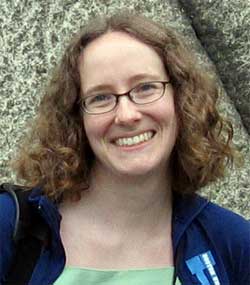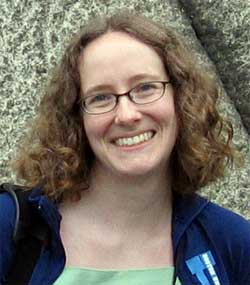 Award recognizes top young scientists studying volcanology, geochemistry
Award recognizes top young scientists studying volcanology, geochemistry
NARRAGANSETT, R.I. – July 19, 2011 – Katherine Kelley, associate professor of oceanography at the University of Rhode Island’s Graduate School of Oceanography, has been named the recipient of the 2011 Hisashi Kuno Award from the American Geophysical Union.
The award recognizes the scientific accomplishments of young scientists who make outstanding contributions to the fields of volcanology, geochemistry and petrology. The American Geophysical Union is the largest professional association of Earth and space scientists in the world.
“It is wonderful news that Katie has been awarded AGU’s Kuno Award but hardly surprising“ said David C. Smith, associate dean of the Graduate School of Oceanography. “Katie has consistently made very substantial contributions to the field of high temperature geochemistry, an area in which GSO has a rich history. She has an international reputation as being both innovative and rigorous, and I see this as just the beginning of what is sure to be an award-winning career.”
“I’m very surprised and deeply humbled by this honor from my scientific peers,” said Kelley, a resident of Wakefield. “It’s a tremendous sign of recognition for the quality of my work, and I couldn’t be more pleased.”
Kelley’s research is focused on developing an understanding of the origins of the different types of rocks on Earth.
“Earth is the only planet in our solar system that has continents, and the rocks that form the basis of our continents are different from those that form our ocean basins,” she said.
Kelley has made several important discoveries about the evolution of Earth in the last two years. In 2009 she published a paper in the journal Science about her research finding that material from subduction zones – sites on the seafloor where tectonic plates have collided, forcing one plate beneath the other – are more oxidized than material from mid-ocean ridges where the plates are pulling apart.
She said that this discovery is important because the availability of oxygen to the mantle controls what minerals are found there, how certain elements behave, and what kind of gasses might be expelled from volcanoes.
A follow-up study in 2010 resolved a long-standing debate among geologists about the movement of oxygen from the Earth’s surface to its mantle and back again.
According to Kelley, some scientists have argued that the availability of oxygen to the mantle hasn’t changed since the Earth was formed. However, if plate tectonics carry this oxidized material into the mantle, as her research has demonstrated, then it is adding oxygen to the mantle. It also suggests that what takes place at the surface of the Earth probably influences what happens deep beneath the surface as well.
The Hisashi Kuno Award will be presented to Kelley at the American Geophysical Union’s fall meeting in San Francisco in December. The award is named for a former professor of petrology at the University of Tokyo who made groundbreaking discoveries about the evolution of volcanic rocks and who served as a mentor to a number of outstanding students who went on to have distinguished careers.

